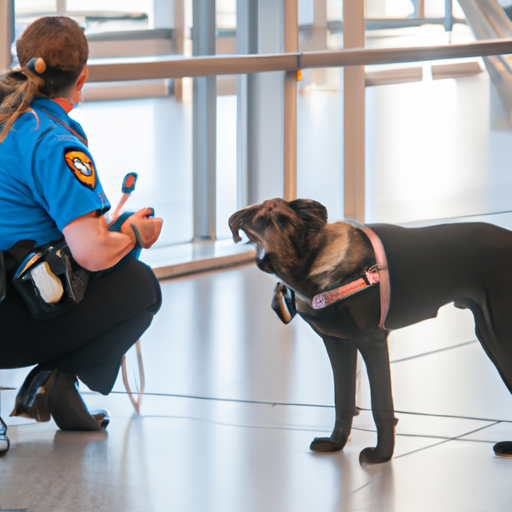As someone who cares deeply, you likely have many questions about the presence of drug dogs at airports. Let’s delve into understanding their roles, training, effectiveness, and frequency of deployment.
1. The Role of Drug Dogs at Airports
Drug dogs, also known as sniffer dogs, play a crucial role in airport security. They are an integral part of the airport’s overall security strategy, assisting in the detection of illicit substances that may pose a threat to public safety. Specifically, these dogs are trained to sniff out a variety of drugs, including marijuana, cocaine, methamphetamines, and heroin.
But their role isn’t limited to detecting drugs. These dogs are also trained to sniff out explosives, firearms, and even agricultural products that may be harmful to local ecosystems.
2. Training of Drug Dogs
The training of drug dogs is rigorous and meticulous. These dogs start their training when they are just puppies, often between the ages of 1 and 3 years. The training process is both physically and mentally demanding, requiring the dogs to have a high level of fitness and intelligence.
Training typically involves:
- Socialization: This helps the dogs feel comfortable in different environments, including busy airports.
- Scent association: The dogs are taught to associate specific smells with rewards.
- Search training: The dogs are trained to search luggage, vehicles, and people.
Different breeds are used for different roles, but some of the most common breeds include Labrador Retrievers, German Shepherds, and Belgian Malinois.
3. Effectiveness of Drug Dogs
There has been considerable debate over the effectiveness of drug dogs. While some studies suggest a high success rate, others point to a significant number of false positives.
One thing is clear though: the presence of drug dogs acts as a strong deterrent. Even if they don’t catch every single person carrying illicit substances, the mere presence of these dogs can discourage people from attempting to smuggle drugs through airports.
| Pros | Cons |
|---|---|
| Strong Deterrent | False Positives |
| Highly Trained | Costly to Train and Maintain |
| Can Detect a Wide Range of Substances | Can be Manipulated |
4. Frequency of Drug Dogs at Airports
The frequency of drug dogs at airports can vary greatly depending on several factors, including the size of the airport, its location, and the specific security threats it faces.
Large international airports are likely to have drug dogs present at all times. Smaller airports, on the other hand, may only have drug dogs on-site periodically or during high-risk periods.
It’s also worth noting that even if a drug dog isn’t visible, there may still be one on duty behind the scenes, searching luggage or cargo.
5. Interacting with Drug Dogs
Remember, drug dogs are working dogs. While they may look friendly and approachable, it’s important to respect their space and not distract them from their duties. Always ask permission from the handler before interacting with a drug dog.
Frequently Asked Questions
1. How are drug dogs chosen for training?
Dogs are chosen based on their breed, temperament, and ability to learn. They must be healthy, intelligent, and responsive to training.
2. What happens if a drug dog alerts to a person or a piece of luggage?
If a drug dog alerts to a person or a piece of luggage, the individual or luggage is subjected to further search by security personnel.
3. Can drug dogs detect prescription medication?
Drug dogs are typically not trained to detect prescription medication. However, they may alert to large quantities of medication due to the strong smell.
4. How long does a drug dog work before retiring?
The working life of a drug dog can vary, but typically, they work for about 7-9 years before retiring.
5. What happens to drug dogs after they retire?
After retirement, many drug dogs are adopted by their handlers. Others may be adopted by loving families who understand the needs of a retired working dog.
In conclusion, the frequency of drug dogs at airports can vary greatly. However, their presence serves as a significant deterrent to drug smuggling and helps maintain airport security. It’s important to respect these highly trained dogs and their vital role in keeping us safe during our travels.



